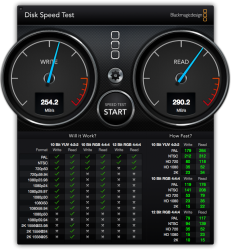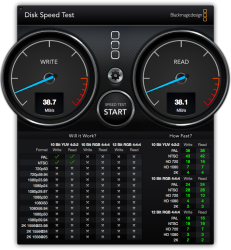Got a tip for us?
Let us know
Become a MacRumors Supporter for $50/year with no ads, ability to filter front page stories, and private forums.
Black magic speed test on nMP
- Thread starter raw911
- Start date
- Sort by reaction score
You are using an out of date browser. It may not display this or other websites correctly.
You should upgrade or use an alternative browser.
You should upgrade or use an alternative browser.
That's consistent with what others have reported. How about a more thorough examination of the Pegasus2? What's your setup? Performance?
That's consistent with what others have reported. How about a more thorough examination of the Pegasus2? What's your setup? Performance?
i posted some #s from an r4 (diskless, but with 2-SSD RAID0) vs the iMac internal SSD and Sonnet enclosure in the Peripherals forum.
the r4's performance with a software RAID was...disappointing. would be curious as to what others find.
i posted some #s from an r4 (diskless, but with 2-SSD RAID0) vs the iMac internal SSD and Sonnet enclosure in the Peripherals forum.
the r4's performance with a software RAID was...disappointing. would be curious as to what others find.
Sorry, I either missed that or forgot about it... I'll look it up. Thanks.
Sorry, I either missed that or forgot about it... I'll look it up. Thanks.
here ya go, VR!
https://forums.macrumors.com/threads/1700079/
here ya go, VR!
https://forums.macrumors.com/threads/1700079/
Thanks... Good read. It would be great to see someone with a pair of EVOs and a Pegasus2 R4 post some similar results with the nMP. However, people, please ditch BlackMagic... That's not a very useful or reliable disk benchmarking tool.
Thanks... Good read. It would be great to see someone with a pair of EVOs and a Pegasus2 R4 post some similar results with the nMP. However, people, please ditch BlackMagic... That's not a very useful or reliable disk benchmarking tool.
Can you please prove your last statement? TIA.
Can you please prove your last statement? TIA.
Nope. My assertion is Just based on my observations using it in a variety of situations. For example (recently)... on my new WD Velociraptor Thunderbolt Duo it was sputtering nonsense on the read out and was erratic - QuickBench worked perfectly fine. On the nMP SSD it said 900MB/s when QuickBench said 1250MB/s and more similar results in the past. If you're happy with it, by all means continue using it. Without any doubt though, it is a sequential I/O test only (at a single block size as far as I know) which only tells a small part of the story.
Nope. My assertion is Just based on my observations using it in a variety of situations. For example (recently)... on my new WD Velociraptor Thunderbolt Duo it was sputtering nonsense on the read out and was erratic - QuickBench worked perfectly fine. On the nMP SSD it said 900MB/s when QuickBench said 1250MB/s and more similar results in the past. If you're happy with it, by all means continue using it. Without any doubt though, it is a sequential I/O test only (at a single block size as far as I know) which only tells a small part of the story.
Thanks for your reply. I have no opinion on the matter.
My old dual G5 died and I ordered a 6-core nMP, 64GB, 1TB PCIe SSD, D700s.
It's scheduled for delivery in March. I have several Firmtek eSATA enclosures.
I already got two Firmtek Thundertek eSATA to Thunderbolt converters for them.
That will give me 8 eSATA links from 2 Thunderbolt ports.
I have a 4-way Crucial SSD Raid in an enclosure that takes 4 eSATA cables.
It will be interesting to see what bandwidth that will sustain on the nMP.
...Without any doubt though, it [Blackmagic] is a sequential I/O test only (at a single block size as far as I know) which only tells a small part of the story.
I agree with that. Blackmagic is free and widely used, however it is designed as a pass/fail test for video. Typically video is dominated by sequential I/O and large transfer sizes. It appears Blackmagic is doing about 1 megabyte I/Os.
Another problem is Blackmagic is a highly fluctuating indicator. It provides no averaged output. So you can run it repetitively on the same machine and get varying numbers.
At least QuickBench provides averaged output and more control over the test parameters. It's also available in Windows, enabling cross-platform comparisons: https://www.speedtools2.com/QuickBench.html
My favorite I/O testing tool is DiskTester. It is an entire suite of test tools with a high degree of control and customization. http://diglloydtools.com/disktester.html
Last edited:
this is the pegasus2 with nMP results
View attachment 458660
Just nMP > pegasus2 > 2-30in apple cinema displays
I'd love it if I can get an real good meaning to what it is I'm looking at AND looking for.
Not really well knowledged on these results. Sorry
Im a composer...so for me its all about orchestral mockups which require a huge amount of samples to be streamed ultra fast from an SSD (reads)
890s are through the roof.....
absolutely awesome
this is the pegasus2 with nMP results
View attachment 458660
Just nMP > pegasus2 > 2-30in apple cinema displays
I'd love it if I can get an real good meaning to what it is I'm looking at AND looking for.
Not really well knowledged on these results. Sorry
which drives? 4x2TB or SSDs?
which drives? 4x2TB or SSDs?
I'm using the pegasus2 4x2TB setup.....in a raid 5 array
I ran 3 speed test
1- internal 1TB HD
2- pegasus 2
3- lacie rugged SSD
Here are my results. Not really sure what they all mean but so if someone likes to chime in and point out something's please feel free.
View attachment 458548
Sorry this is the internal can't get the other 2 to load
That 200 faster on both fronts than I have ever seen. I and any other test I've seen with a late 2013 model with ssd is in the low 700's. Hick up or did you do something dif?
EDIT. Oh ignore me that's a Mac Pro. I read it as MacBook Pro
Seagate Backup Plus BlackMagic Results
I just picked up a 3 TB Backup Plus USB 3.0 drive from Costco as it was so cheap ($99). What is interesting about the results is that they are so slow - firewire 800 rather than USB 3.0 speeds. Went to the Seagate site and, lo and behold, they don't list any transfer rates even in the tech specs or the data sheet! That's fine, however, as just using for backups.
I just picked up a 3 TB Backup Plus USB 3.0 drive from Costco as it was so cheap ($99). What is interesting about the results is that they are so slow - firewire 800 rather than USB 3.0 speeds. Went to the Seagate site and, lo and behold, they don't list any transfer rates even in the tech specs or the data sheet! That's fine, however, as just using for backups.
Attachments
I just picked up a 3 TB Backup Plus USB 3.0 drive from Costco as it was so cheap ($99). What is interesting about the results is that they are so slow - firewire 800 rather than USB 3.0 speeds. Went to the Seagate site and, lo and behold, they don't list any transfer rates even in the tech specs or the data sheet! That's fine, however, as just using for backups.
Those are close to FW 400 speeds! With a reasonably fast drive you should see FW 800 speeds in the low to mid 80s. Did you reformat the disk? Sometimes that helps.
BlackMagic Speed Disk Test was developed to measure video transfer rates. Reading the test should not be accomplished from the dials but instead the average rates listed in green on the lower right side of the test screen. There is a variable stress that can be set from 1-5 Gigabytes with 5 being the most accurate average scores. The test are done in an 8 second loop and continue until you manually stop them. The 1 GB stress setting will produce the fastest but not the most accurate result.
Register on MacRumors! This sidebar will go away, and you'll see fewer ads.







